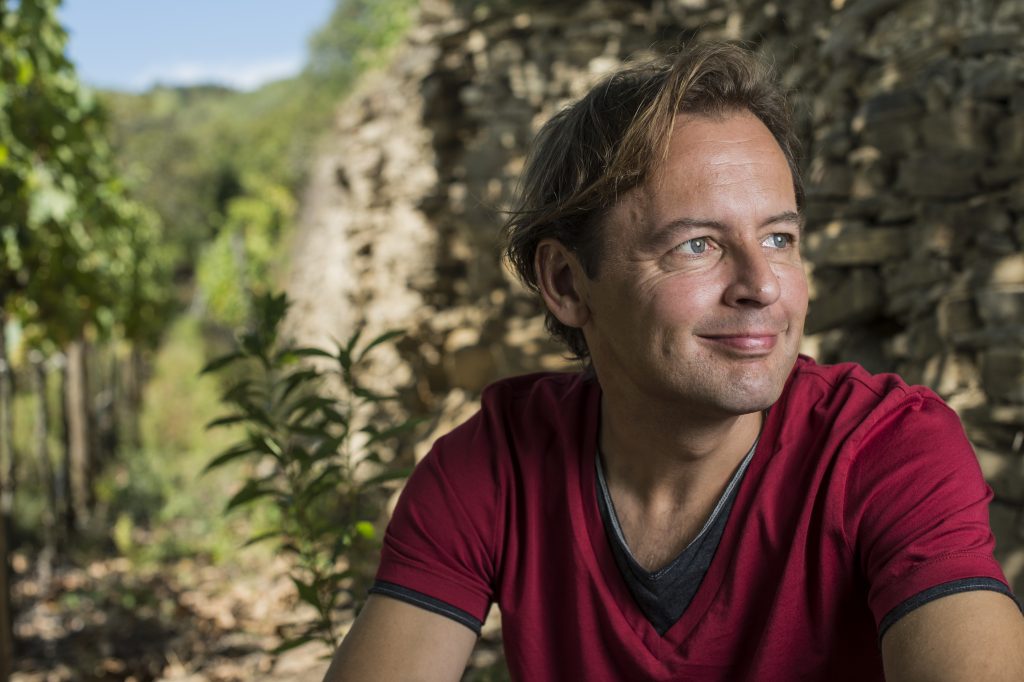
Congratulations to Fritz Miesbauer, newly crowned 2020 Winemaker of the Year. Whenever Falstaff Magazine announces the result, the winner is the toast of Austria. But this year it’s a little different; an entire city and 28 monks are celebrating because our friend Fritz is both head honcho at Weingut Stadt Krems and guiding light for the wines at Stift Göttweig.
It’s mammoth achievement for someone to receive this accolade while representing both an entire city and an ancient monastery. But Fritz and his young, motivated team have pulled it off after propelling Stadt Krems to the peak of Austria’s winemaking elite, and elevating Stift Göttweig to star status at the same time.
Fritz looks after just over 40 hectares currently owned by the city of Krems, including numerous parcels in exceptional sites. The vineyards are among the oldest in the region and were gifted to the city in 1452. Fritz arrived at the helm in 2003, having already worked wonders on what is now Domäne Wachau.
By the time he got here, Stadt Krems had lost much of its lustre. “I was always convinced that the estate’s vineyards held tremendous potential,” Fritz is now able to reflect. But to realise that potential, mountains of work had to be done. Among other things, they rehabilitated vines and trellising, completely replanted 29 hectares, restored ancient stone walls on 5.4 hectares and went through four phases of renovation, expansion and modernisation of the cellars. Fritz’s team also grew from four employees in 2004 to 23 in 2020
Stift Göttweig is another exceptional story. The Benedictine abbey stands proudly across from Krems on the south bank of the Danube. Monks have been cultivating wine on its 26 hectares of vineyards for almost 900 years. Winegrowing was first outsourced in the 1980s, and in 2006 a consortium of wine-lovers assumed responsibility for cultivation, handing the reins to Fritz. He has repaid the faith of his particularly devout partners in no short measure.
“To succeed in the wine industry, you need a tremendous amount of patience, because change takes at least a decade to really manifest itself, and sometimes a full generation,” Fritz says.
We certainly take our hat off to him. What he’s done at these unique, historic estates in a relatively short space of time is quite extraordinary.
2019 Stadt Krems Lössterrassen Grüner Veltliner $24
This typical Veltliner is tangy and light. This is because of the good loess soil and the very good climate. In the first weeks of October the grapes were handpicked with strict selection. After they were destemmed and pressed carefully, the must was fermented under controlled temperature in a stainless steel tank. It’s fresh and fruity with notes of pineapple and grapefruit. It has pleasant acidity and flavours of pear, pineapple and grapefruit on the palate, finishing crisply.
2017 Stadt Krems Ried Wachtberg Grüner Veltliner $77
Beautifully aromatic notes of ripe Russet pear peel beckon on the nose. On the palate, this lovely fruit is joined by zesty pithiness with just an edge of pleasant bitterness that lends real grip amid the flowing, exuberant juiciness. It is the aromatic pear that owns the long finish.
93 points. Anne Krebiehl MW, Wine Enthusiast
2013 Stadt Krems Ried Grillenparz Riesling $60
Juicy stonefruit, cool mint, rocks and a savoury grilled nut aspect. Round and juicy, stony acid through it, citrus tang, but mineral and flavour flavour flavour. Clean finish. Delightful.
94 points. Gary Walsh, The Wine Front
2008 Stadt Krems Ried Grillenparz Riesling $60
A plush white, with plenty of rich, creamy notes to the ripe pear, apple and peach flavors, featuring a rich finish of piecrust and spice. Drink now through 2017.
91 points. Kim Marcus, Wine Spectator
2019 Stift Göttweig Messwein Grüner Veltliner $27
The aroma of freshly cut Conference pear peel is streaked with citrus on the nose. The palate is slender and comes with a lovely tinge of yeasty, herbal saltiness. Light, fresh, dry and yummy.
89 points. Anne Krebiehl MW, Wine Enthusiast
2018 Stift Göttweig Furth Grüner Veltliner $36
Aromatic peach has a lemon overtone on the nose. The palate is fruity, slender and ripples across the tongue with citrusy yet mild freshness. The dry finish shows more zestiness.
90 points. Anne Krebiehl MW, Wine Enthusiast

